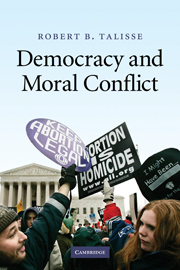3 - Folk epistemology
Published online by Cambridge University Press: 03 December 2009
Summary
Thus far the discussion has been devoted primarily to stage-setting. I have argued that the most popular responses to the problem of deep politics share the presumption that if we are to avoid a modus vivendi politics based in a Hobbesian truce, we must identify a “minimal moral conception” that could both support democratic politics and sustain the loyalty of citizens otherwise deeply divided over fundamental moral commitments. In this way, the dominant responses hold that democratic theory must be “freestanding,” that is, free from deep moral entanglements but, nonetheless, sturdy enough to function as a moral foundation for democratic politics. In Chapter 2, I argued that this strategy is for several reasons non-viable. In general, the problem confronting the freestanding strategy is that even a minimal moral conception is contestable both in terms of its standing qua moral conception and as an interpretation of the “shared fund” of commonly accepted principles. This is especially so when the minimal conception places controversial constraints on citizens' political deliberation, advocacy, and action. In order to fill in the details of the freestanding account, one must tell a philosophical story about the normative appropriateness of the “shared fund;” but to tell such a story is to provide specific philosophical and moral content to that which was supposed to be freestanding, thereby inviting the kind of moral controversy that was supposed to be circumvented.
- Type
- Chapter
- Information
- Democracy and Moral Conflict , pp. 79 - 120Publisher: Cambridge University PressPrint publication year: 2009



